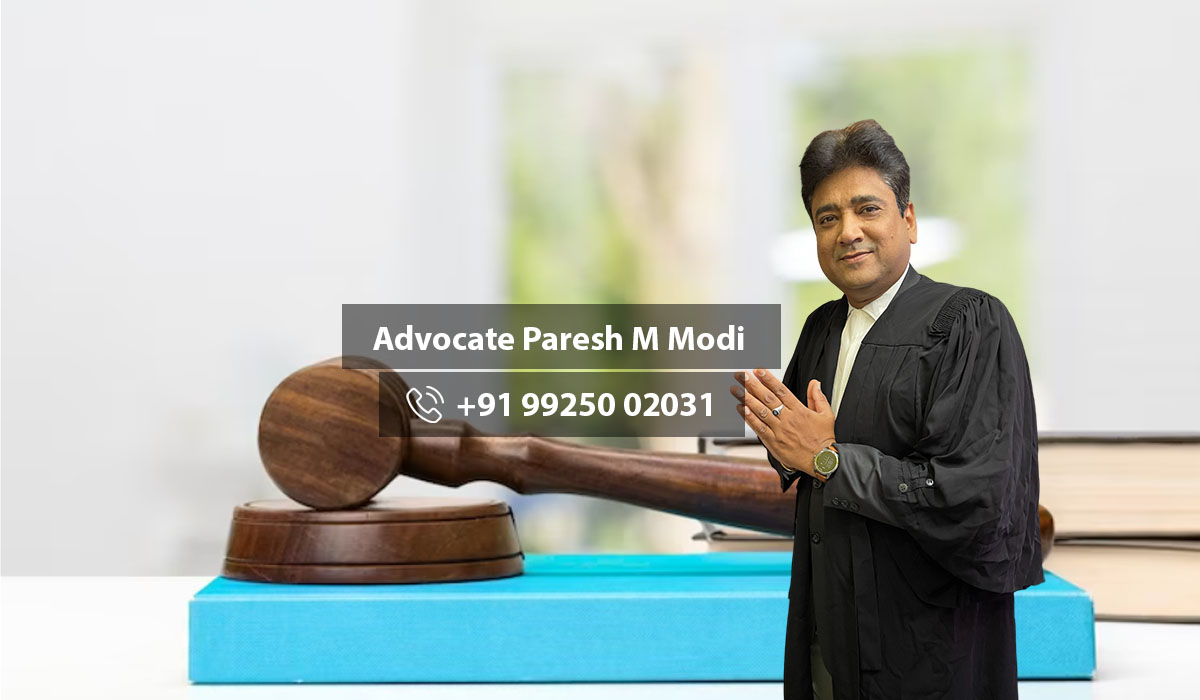જો પત્નીનું મૃત્યુ ઇન્ટેસ્ટેટ (વિલ વગર) થાય, તો તેની મિલકતનો કાયદેસર વારસ કોણ હશે | એડવોકેટ પરેશ એમ મોદી | 9925002031
હિંદુ વારસાગત કાયદો, 1956 મુજબ, હિંદુ સ્ત્રીના મૃત્યુ પછી તેના સંપત્તિનું વારસાગત હક અલગ અલગ પરિસ્થિતિઓમાં બદલાય છે. જો પત્ની વિલ વગર મૃત્યુ પામે, તો તેના સંપત્તિની વહેંચણી માટે નીચે મુજબ નિયમો લાગુ પડે છે:
(1) જો પત્ની પોતાની કમાણી/સ્વ-અર્જિત સંપત્તિ માટે વિલ વગર મૃત્યુ પામે
વારસદારો અને વારસાગત હક્ક: હિંદુ વારસાગત કાયદાની કલમ 15(1) અને કલમ 16 મુજબ
હિંદુ સ્ત્રીનાં મૃત્યુ પછી તેની સ્વ-અર્જિત સંપત્તિ નીચે મુજબ વારસદારોમાં વહેંચાય:
વારસદારોની શ્રેણી:
- પ્રથમ શ્રેણી: પતિ, પુત્ર, પુત્રી (અને મરણ પામેલા પુત્ર અથવા પુત્રીના સંતાનો)
- બીજી શ્રેણી: પતિના વારસદારો (જો સંતાન અને પતિ ના હોય)
- ત્રીજી શ્રેણી: માતા-પિતા (માતા અને પિતા)
- ચોથી શ્રેણી: પિતાના વારસદારો (ભાઈ, બહેન, વગેરે)
- પાંચમી શ્રેણી: માતાના વારસદારો
પતિનો અધિકાર:
- જો પત્નીને સંતાનો નથી, તો પતિ સંપત્તિનો મુખ્ય હકદાર બને છે.
- જો પત્ની પાછળ સંતાનો હોય, તો સંપત્તિ સંતાનો અને પતિ વચ્ચે સમાન પ્રમાણમાં વહેંચાય.
(2) જો પત્ની માતા-પિતાની વારસાગત સંપત્તિ માટે વિલ વગર મૃત્યુ પામે
વારસદારો અને હક્ક: હિંદુ વારસાગત કાયદાની કલમ 15(2) મુજબ
કલાક 15(2) મુજબ, જો હિંદુ સ્ત્રી માતા-પિતાની સંપત્તિ વારસાગત રૂપે મેળવે, અને તેણી વિલ વગર મૃત્યુ પામે, તો તે સંપત્તિ પતિ પાસે નહીં જાય, પરંતુ તેના માતા-પિતાના વારસદારો તરફ પાછી જાય છે.
વારસદારો માટે નિયમો:
- જો સ્ત્રીને સંતાનો હોય: તેનાં સંતાનો સંપત્તિના વારસદારો રહેશે.
- જો સ્ત્રીને સંતાન ના હોય: તો તે સંપત્તિ તેનાં પિતા તરફ પાછી જશે (ભાઈ, બહેન, વગેરે).
- પતિનો આ સંપત્તિ પર કોઈ અધિકાર નથી, જો પત્ની સંતાનરહિત મૃત્યુ પામે.
પતિનો અધિકાર:
- જો પત્ની પાછળ સંતાન હોય, તો પતિ સંતાનો સાથે સંપત્તિ હક્કદાર બની શકે.
- જો પત્ની પાછળ સંતાન ના હોય, તો પતિને કશું જ મળતું નથી, અને સંપત્તિ તેનાં પિતા તરફ પાછી જાય છે.
હિંદુ વારસાગત કાયદાની મહત્વપૂર્ણ કલમો:
- કલાક 15(1): હિંદુ સ્ત્રીની સંપત્તિ માટે સામાન્ય વારસાગત નિયમો.
- કલાક 15(2): માતા-પિતાની સંપત્તિ માટે વિશિષ્ટ નિયમો.
- કલાક 16: વારસદારો વચ્ચે સંપત્તિ વહેંચવાની પદ્ધતિ.
સંક્ષિપ્ત સાર:
| સંપત્તિનો પ્રકાર | વારસદારો કોણ? | પતિને અધિકાર છે કે નહીં? |
|---|---|---|
| સ્વ-અર્જિત સંપત્તિ | પતિ, સંતાન, માતા-પિતા | હા, કલમ 15(1) મુજબ |
| માતા-પિતાની વારસાગત સંપત્તિ | માતા-પિતાના પરિવાર તરફ પાછી જાય છે | ના, કલમ 15(2) મુજબ |
પ્રયોજ્ય તથ્યો:
- જો પત્ની પાસે પોતાની કમાણી હોય, તો પતિ હકદાર બને છે.
- જો પત્ની માતા-પિતાની સંપત્તિ વારસાગત રૂપે મેળવે, અને તેના સંતાન ના હોય, તો પતિને કશું જ મળતું નથી.
સલાહ: પતિ કે પત્ની નાની ઉમરે મરણ પામે તે પહેલાં વિલ બનાવવું મહત્વનું છે, જેથી સંભવિત વિવાદો ટાળી શકાય.
જો તમારે જમીન-જાયદાદ કે અન્ય કાયદેસર મુદ્દા માટે સલાહ જોઈએ હોય, તો એડવોકેટ પરેશ એમ મોદી, અમદાવાદ, ગુજરાત દ્વારા યોગ્ય માર્ગદર્શન મેળવી શકો છો.
સંપર્ક વિગતો:
- મોબાઇલ (ફક્ત વોટસેપ): +91 9925002031 (સવાર 9 થી રાત 9 વાગ્યા સુધી)
- ઓફિસ લૅન્ડલાઇન: +91-79-48001468 (સવાર 10.30 થી સાંજ 6.30, કાર્યકારી દિવસોમાં)
- ઈમેલ: advocatepmmodi@gmail.com
- વેબસાઇટ: www.advocatepmmodi.in
- ઓફિસ સરનામું: C/112, સુપથ-2 કોમ્પ્લેક્સ, કોહિનૂર પ્લાઝા હોટેલ સામે, જૂના વાડજ બસ સ્ટેન્ડ પાસે, આશ્રમ રોડ, અમદાવાદ – 380013, ગુજરાત, ભારત.
(ઓફિસ મુલાકાત માટે પહેલાં ફોન દ્વારા સમય નક્કી કરી લો.)

